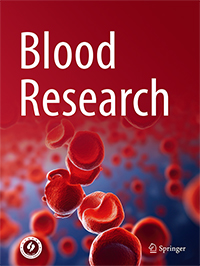Korean J Hematol 2004; 39(3):
Published online September 30, 2004
© The Korean Society of Hematology
자가 면역성 용혈성 빈혈의 단기간 스테로이드 치료 후 발생한 크립토콕쿠스 수막염 1례
홍석인, 송명준, 김연성, 김태훈, 조석구, 이동건, 이혜경
가톨릭대학교 의과대학 혈액종양내과,
가톨릭대학교 의과대학 감염내과,
가톨릭대학교 의과대학 임상병리과
A Case of Cryptococcal Meningitis Developed after Short-term Therapy of Steroid in a Patient with Autoimmune Hemolytic Anemia
Cryptococcus neoformans commonly causes opportunistic infection in other immunocompromised patients as well as in AIDS. Among cryptococcosis, cryptococcal meningitis is a relatively frequent manifestation and causes serious morbidity and mortality. It needs urgent diagnosis and effective antifungal therapy. We experienced cryptococcal meningitis in a 25-year- old female patient with autoimmune hemolytic anemia. She was admitted because of autoimmune hemolytic crisis. Her anemic symptoms were controlled by steroid and red cell transfusions. However, she was suddenly readmitted with decreased mentality. Seven days later, she was diagnosed as cryptococcal meningitis and cryptococcemia resulting from culture studies of CSF and blood. Since treated with amphotericin B and flucytosine and maintained with prudent fluconazole therapy, her symptoms and general conditions were improved. We report an unusual case of cryptococcal meningitis developed in a patient with autoimmune hemolytic anemia in spite of short-term steroid therapy.
Keywords Meningitis, Cryptococcal meningitis, Anemia, Hemolytic, Autoimmune, Steroids
Article
Korean J Hematol 2004; 39(3): 191-195
Published online September 30, 2004
Copyright © The Korean Society of Hematology.
자가 면역성 용혈성 빈혈의 단기간 스테로이드 치료 후 발생한 크립토콕쿠스 수막염 1례
홍석인, 송명준, 김연성, 김태훈, 조석구, 이동건, 이혜경
가톨릭대학교 의과대학 혈액종양내과,
가톨릭대학교 의과대학 감염내과,
가톨릭대학교 의과대학 임상병리과
A Case of Cryptococcal Meningitis Developed after Short-term Therapy of Steroid in a Patient with Autoimmune Hemolytic Anemia
Seok In Hong, Myoung Joon Song, Yeon Seong Kim, Tae Hun Kim, Seok Goo Cho, Dong Gun Lee, Hae Kyung Lee
Division of Hematology, Infectious Disease, Clinical Laboratories, Department of Internal Medicine, The Catholic University of Korea College of Medicine, Seoul, Korea
Abstract
Cryptococcus neoformans commonly causes opportunistic infection in other immunocompromised patients as well as in AIDS. Among cryptococcosis, cryptococcal meningitis is a relatively frequent manifestation and causes serious morbidity and mortality. It needs urgent diagnosis and effective antifungal therapy. We experienced cryptococcal meningitis in a 25-year- old female patient with autoimmune hemolytic anemia. She was admitted because of autoimmune hemolytic crisis. Her anemic symptoms were controlled by steroid and red cell transfusions. However, she was suddenly readmitted with decreased mentality. Seven days later, she was diagnosed as cryptococcal meningitis and cryptococcemia resulting from culture studies of CSF and blood. Since treated with amphotericin B and flucytosine and maintained with prudent fluconazole therapy, her symptoms and general conditions were improved. We report an unusual case of cryptococcal meningitis developed in a patient with autoimmune hemolytic anemia in spite of short-term steroid therapy.
Keywords: Meningitis, Cryptococcal meningitis, Anemia, Hemolytic, Autoimmune, Steroids

Article Tools
Stats or Metrics
Related articles in BR
-
Four Cases of Idiopathic Autoimmune Hemolytic Anemia in Children
Mi Jeong Lee, Se Won Paik, Hyo Seop Ahn, Chang Yee Hong
Korean J Hematol 1985; 20(2): 331-336 -
Lenalidomide for anemia correction in lower-risk del(5q) myelodysplastic syndrome patients of Asian ethnicity
Junshik Hong, Yoo Jin Lee, Sung Hwa Bae, Jun Ho Yi, Sungwoo Park, Myung Hee Chang, Young Hoon Park, Shin Young Hyun, Joo-Seop Chung, Ji Eun Jang, Joo Young Jung, So-Yeon Jeon, Seo-Young Song, Hawk Kim, Dae Sik Kim, Sung-Hyun Kim, Min Kyoung Kim, Sang Hoon Han, Seonyang Park, Yoo-Jin Kim, Je-Hwan Lee, on behalf of the AML/MDS Working Party of the Korean Society of Hematology
Blood Res 2021; 56(2): 102-108 -
Treatment of autoimmune hemolytic anemia: real world data from a reference center in Mexico
José Carlos Jaime-Pérez, Patrizia Aguilar-Calderón, Lorena Salazar-Cavazos, Andrés Gómez-De León, David Gómez-Almaguer
Blood Res 2019; 54(2): 131-136




 PDF
PDF Standard view
Standard view Export citation
Export citation Share
Share  Previous Article
Previous Article



